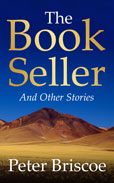
 |
Dr. Andre Vidal, raised in Latin American poverty, reveres books, a rarity in his childhood environment. Now he is the director of collections at a library shaken with accusations of incompetence at best, outright theft at the worst. When police inspector Guillermo Robles comes to call, the possibility of staff stealing and reselling the rare books in Vidal's purview is discussed. Investigations lead to the only bookshop in town, run by a cranky old character who offers no excuse for the obvious way in which he trades in supposedly "withdrawn" library offerings. With a "Withdrawn" stamp and inkpad found in the bookseller's desk drawer, the investigation seems closed.
Meanwhile, Vidal is content with his intellectual pursuits and evenings spent with his lady friend, Teresa, sharing obscure academic interests and mutual physical passions. Years later, changes in Vidal's scene will provide revelations so incredible that Robles will find himself in the center of a long, complex chain of events based around Vidal's unique conviction about the importance of preserving the printed word.
Author/translator Briscoe, the creator of this short but intensely involving work, has served as an academic library administrator. His protagonist, Vidal, is depicted as a self-made, rather lonely individual who sees books, thought of for so long in human history as printed repositories of wisdom, fast becoming digital—essentially invisible material. The argument for continuing to make information and inspiration handheld and on paper permeates these four interconnected offerings, of which the title story is by far the longest. The author combines emotive echoes of Latin American literary style with cops-and-robbers plot twists. Robles determinedly digs as Vidal watches and waits. And, importantly, Briscoe presents a multi-layered view of a gradually evolving change in our shared intellectual experience that deserves serious contemplation.